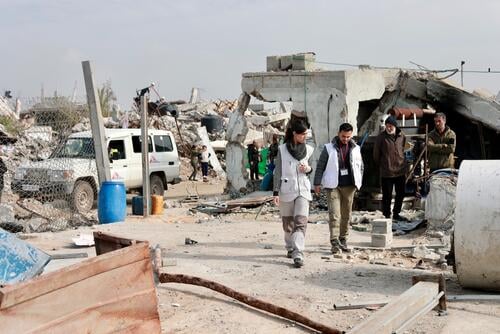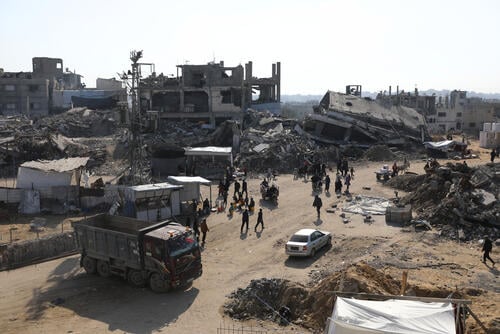Israel’s war on Gaza has so far killed more than 44,000 Palestinians, wounded more than 105,000 and displaced approximately 1.9 million people or 90 per cent of the population, according to the Gaza Ministry of Health (MoH). In response to the horrific attacks carried out by Hamas and other armed groups on 7 October 2023, in which 1,200 people were killed and 251 taken hostage,1 Israeli forces are crushing an entire population under bombs and rubble.
Médecins Sans Frontières (MSF) has witnessed 14 months of repeated attacks on civilians, the dismantling of essential civilian infrastructure including healthcare facilities, and a systematic denial of humanitarian assistance, seemingly underpinning Israel’s campaign to unravel the very fabric of society in Gaza. In the first 12 months of hostilities, MSF staff themselves have endured 41 attacks and violent incidents, including airstrikes, shelling and violent incursions in health facilities, direct fire on its shelters and convoys and arbitrary detention by Israeli forces. Eight MSF colleagues and many of their family members have been killed, many more have been injured. Medical personnel and patients alike have been forced to urgently evacuate health facilities on 17 separate occasions, often literally running for their lives. MSF has only been able to restart activities in three facilities.
Throughout the offensive, Israeli forces have blocked essential items such as food, water and medical supplies from entering the Strip. They have either denied, delayed or instrumentalised humanitarian assistance, allowing insignificant quantities of aid into Gaza with a complete disregard for the actual needs and the level of suffering of the population. Gaza’s last remaining oncological hospital had to shut down as it ran out of fuel on 1 November 2023. MSF teams had to carry out surgery without sufficient anaesthesia. The consequences of these impediments are made even more harmful due to the uniqueness of a war being waged on a besieged area from which nobody can escape.
The violence unleashed by Israeli forces has caused physical and mental damage on a scale that would overwhelm any functioning health system, let alone one already decimated by a crushing offensive and a 17-year-long blockade. As of mid-October, only 17 of Gaza’s 36 hospitals are partially functioning2, though the unabated fighting often puts them out of reach for those who need them. The other 19 hospitals are out of service. Seeking care out of the Strip is made extremely difficult by the Israeli authorities. Between the closure of the Rafah crossing in early May 2024 and September 2024, only 229 patients were authorized to be evacuated - this amounts to 1.6 per cent of those who needed it at the time.
Forcible displacement has pushed people into unbearable living conditions: they are crammed in makeshift tents made from scraps, suffering from water and food deprivation. The main morbidities observed by MSF teams supporting primary healthcare, such as skin diseases, upper respiratory tract infections and diarrhoea, are indicative of the appalling hygiene conditions. Vaccination schemes have been disrupted and the risk of outbreaks is real. The situation has only worsened as the winter months set in.
Even if the offensive ended today, its long-term impact would be unprecedented, given the scale of the destruction and the unique challenges of organising healthcare in Gaza. A whole society needs rebuilding, while coping with a staggering number of war-wounded who may require years of rehabilitation, and risk infections, amputations and permanent disability. The mental trauma caused by the violence, the loss of family members and homes, the strenuous living conditions and the repeated displacement, represent a massive and urgent need, which will span generations. The environmental impact of the war will further aggravate the long-term health risks. The number of excess deaths due to the war including those due to the collapse of healthcare, malnutrition and disease outbreaks, may be conservatively estimated at 186,000 (including 148,000 indirect deaths), according to The Lancet3. Struggling to survive, trapped in a war zone with no safe space and no exit in sight, people in Gaza are living in a death trap.
In the north of the Strip in particular, the recent military offensive is a clear illustration of the brutal war the Israeli forces are waging on Gaza, and we are witnessing clear signs of ethnic cleansing as Palestinian life is being wiped off the area. Our firsthand observations of the medical and humanitarian catastrophe inflicted on Gaza are consistent with the descriptions provided by an increasing number of legal experts and organisations concluding that genocide is taking place in Gaza. While we don't have legal authority to establish intentionality, the signs of ethnic cleansing and the ongoing devastation—including mass killings, severe physical and mental health injuries, forced displacement, and impossible conditions of life for Palestinians under siege and bombardment—are undeniable.
Attacks on civilians, the dismantling of the healthcare system, the deprivation of food, water and supplies are a form of collective punishment inflicted by the Israeli authorities on the people of Gaza. This must stop now.
- An immediate and sustained ceasefire must be implemented. The complete destruction of Palestinian life in Gaza and all things that make up the very fabric of society must stop.
- The shameful and extreme rationing of humanitarian aid in the Gaza Strip must stop. Israel must end its siege on Gaza and open critical land borders, including the Rafah crossing, to ensure the scale delivery of humanitarian and medical aid on a massive scale. Israel must take all necessary steps to ensure that urgently needed aid reaches those in need, including by putting a stop to actions that disrupt law enforcement capacities within the Gaza Strip.
- Israel must revoke its recent law banning UNRWA and ensure that the agency can continue its vital role in supporting the population. The remaining local capacities in Gaza must be rebuilt and scaled up.
- Forced displacement must end. People in Gaza must be allowed to move freely, including returning to their places of origin, and restore their livelihood capacities. Israeli authorities must facilitate the evacuation of those who need specialised care or those who seek refuge outside of Gaza to leave, while ensuring their right to a safe, voluntary, and dignified return.
- In January 2024, the International Court of Justice (ICJ) ordered Israel to implement provisional measures to prevent genocidal acts in Gaza. Despite this, no action has been taken to address these measures. MSF’s firsthand observations align with those of an increasing number of legal experts and organizations, concluding that ethnic cleansing and genocide are taking place in Gaza. MSF calls on States, particularly Israel’s closest allies, to end their unconditional support for Israel and fulfill their obligation to prevent genocide in Gaza. States must leverage their influence to alleviate the suffering of the population and enable a massive scale-up of humanitarian assistance in the Gaza Strip.
- MSF renews its call for an independent investigation to determine the facts and responsibilities behind the repeated attacks on MSF teams and facilities, which killed eight MSF colleagues and many of their family members. This call also extends to investigating other attacks on humanitarian workers and medical staff.
Source from Reuters – Available here






